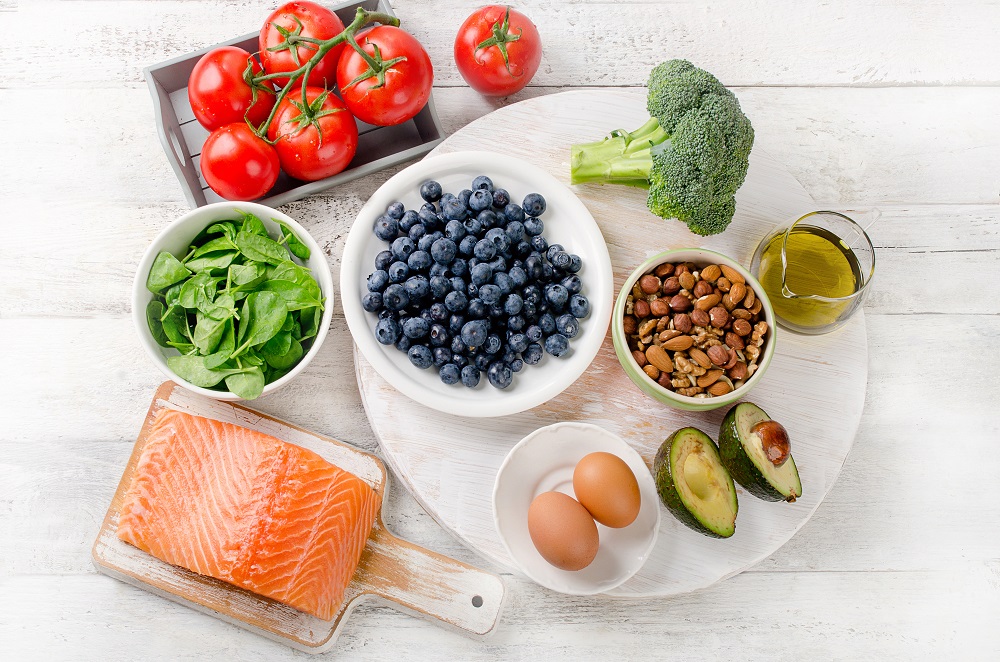Eat Your Way to Wellness: How to Change to a Healthy Diet

Healthy eating doesn’t necessarily mean that you have to stay thin by depriving yourself of your favorite dishes. Instead, it’s about improving your health by avoiding meals that could adversely affect your energy and mood.
Sometimes when a doctor gives you diet advice, you are left overwhelmed by the type of foods you have to avoid to keep yourself healthy. However, these experts want you to keep away from certain nutrients because they damage your body and make you unfit.
Unfortunately, due to the fast-paced life in many developed countries, nowadays most people rely on cheap-fast food chains to get the nourishment they need. Apart from this, the ‘tasty’ products are also aggressively advertised as good to eat, without stressing the fact that eating a fast food diet comes with numerous health risks.
https://www.youtube.com/watch?v=IkoC3HZwe7Q&vl=en
With powerful fast-food chains such as McDonald’s and KFC, most political plans for a crackdown on the junk food business have failed. Also, even though several research studies show that junk food increases childhood obesity, diabetes, and heart-related diseases, these fast-food conglomerates are quickly spreading their roots to other developing nations in the world.
By selling well-marketed products to naive customers, these companies create real health issues among local or global communities and promote their brand even to small children. Sadly, junk food can become very addictive for kids, and regular consumption will lead the children to have complications like obesity, chronic illness, and low self-esteem.
[tweet_box design="box_9"]According to scientists, children who eat a lot of junk food don’t perform well in their studies and other co-curricular activities.[/tweet_box]
According to scientists, children who eat a lot of junk food don’t perform well in their studies and other co-curricular activities. Causing irreversible damage to the lives of our younger generations the fast food epidemic needs urgent attention.
[box type="info" align="" class="" width=""]
Since 1970, the number of fast food restaurants in business doubled, which equates to about 300,000 establishments in the United States. Coincidentally, 33.8 percent of the U.S. population is affected by obesity and 19 percent of children and adolescents are also affected. -- ObesityAction.org
[/box]
Children set the foundation for lifelong habits in their youth and making junk food accessible within their schools is indeed a hazardous business. Besides, people should consider the costs of eating processed foods as the lack of consumption of fruits and veggies is very damaging for physical and mental health in the long run.
Don't set yourself up for defeat and refuse to build for yourself a low quality of life that will affect not only you but your family too.
Physicians worldwide relate healthy eating habits with the necessity of a balanced diet. What we eat should contain the right of fiber, proteins, carbohydrates, fat, minerals, and vitamins to sustain our body's energy and nutrient needs.

Switching to a healthy diet can be challenging for some who wants to get it right from the beginning. To make it easier for you, you can think of specific food-related diseases every time you want to eat something unhealthy.
If you set your goals right, you can definitely achieve a healthy lifestyle within a short period of time.
Healthy eating requires that you keep your diet simple, so you don’t have to ruin it by adding unnecessary additives to your food. Instead of counting the calories of each item when shopping, look for fresh produce. If you follow the steps below, preparing healthier food and adopting a new lifestyle should be as easy as possible:

Cooking at home can help you be in charge of what you need to eat, and it can also help you monitor the progress that you’ve made by eating healthier. As a result, you will avoid the consumption of chemical additives, unhealthy fats, and added sugars that are present in a lot of junk foods.
For example, you can replace solid fats by using fats derived from corn. Research studies have shown that due to the phenols found in pure olive oil, it is safer to use this oil than corn oil because it doesn't clot your blood.
By doing this, you will foster new healthy eating habits. Also, even when you are not eating, remind yourself now and then how good it feels to make the right food choices.

Because water helps our bodies to drive out toxins and waste products that have accumulated into the system, staying hydrated are very crucial to our bodies. Experts suggest that one should drink at least 2 liters of water per day to avoid dizziness, headaches, and nausea caused by dehydration.
Most important, we should avoid eating cheap fast foods which have detrimental effects on our health and lead us to getting ‘fat’ and out of shape.
Developing a healthy eating habit is not an easy task, but if you put in the effort, you will have a lot to smile about at the end of the journey.
Besides, your body will be forever grateful for changing your lifestyle.
Sometimes when a doctor gives you diet advice, you are left overwhelmed by the type of foods you have to avoid to keep yourself healthy. However, these experts want you to keep away from certain nutrients because they damage your body and make you unfit.
Unfortunately, due to the fast-paced life in many developed countries, nowadays most people rely on cheap-fast food chains to get the nourishment they need. Apart from this, the ‘tasty’ products are also aggressively advertised as good to eat, without stressing the fact that eating a fast food diet comes with numerous health risks.
https://www.youtube.com/watch?v=IkoC3HZwe7Q&vl=en
With powerful fast-food chains such as McDonald’s and KFC, most political plans for a crackdown on the junk food business have failed. Also, even though several research studies show that junk food increases childhood obesity, diabetes, and heart-related diseases, these fast-food conglomerates are quickly spreading their roots to other developing nations in the world.
By selling well-marketed products to naive customers, these companies create real health issues among local or global communities and promote their brand even to small children. Sadly, junk food can become very addictive for kids, and regular consumption will lead the children to have complications like obesity, chronic illness, and low self-esteem.
[tweet_box design="box_9"]According to scientists, children who eat a lot of junk food don’t perform well in their studies and other co-curricular activities.[/tweet_box]
According to scientists, children who eat a lot of junk food don’t perform well in their studies and other co-curricular activities. Causing irreversible damage to the lives of our younger generations the fast food epidemic needs urgent attention.
[box type="info" align="" class="" width=""]
Since 1970, the number of fast food restaurants in business doubled, which equates to about 300,000 establishments in the United States. Coincidentally, 33.8 percent of the U.S. population is affected by obesity and 19 percent of children and adolescents are also affected. -- ObesityAction.org
[/box]
Children set the foundation for lifelong habits in their youth and making junk food accessible within their schools is indeed a hazardous business. Besides, people should consider the costs of eating processed foods as the lack of consumption of fruits and veggies is very damaging for physical and mental health in the long run.
Don't set yourself up for defeat and refuse to build for yourself a low quality of life that will affect not only you but your family too.
What are the Fundamentals of a Healthy Diet?
Physicians worldwide relate healthy eating habits with the necessity of a balanced diet. What we eat should contain the right of fiber, proteins, carbohydrates, fat, minerals, and vitamins to sustain our body's energy and nutrient needs.

- Fiber: You should eat foods such as vegetables, fruits, nuts, grains, and beans which are rich in dietary fiber. Research studies have shown that these foods actually lower the risk of getting a stroke, heart diseases, and diabetes. Furthermore, it makes your skin naturally look flawless, and helps with weight loss.
- Proteins: Foods rich in proteins support the process of reconstructing the damage done to the body and its cells. Proteins also help support cognitive functions while also improving and stabilizing mood swings. However, researchers have proved that too much protein is dangerous for your health. Multiple studies have already shown that continuous consumption of red meat can cause cancer and kidney related diseases in the long run. Luckily for us, we can acquire other high-quality proteins from plant products such as beans, groundnuts, and cashew nuts. And yes, this means that you don’t have to necessarily source your proteins from animal products which may be harmful.
- Fat: While not all fats are good for you, it's essential that you supplement your diet with good fats that protect your brain, heart, and other body parts. Certain fats such as omega-3s are crucial for physical and emotional health.
- Carbohydrates: Carbs are the primary energy source for your body, and your diet should ideally be composed of unrefined carbs such as whole grains. Cut back the consumption of refined carbs like bread, sugars, starches, and pastries. Refined carbs can result in rapid spikes in blood sugar level leading to fluctuations in mood and energy. Besides, excess carbohydrates get converted into fats making it, therefore, essential that you only take the right amounts.
- Calcium: Not getting enough calcium can cause osteoporosis, depression, and lack of sleep, and therefore calcium consumption is vital in order to achieve a healthy lifestyle.
Switching to a healthy diet can be challenging for some who wants to get it right from the beginning. To make it easier for you, you can think of specific food-related diseases every time you want to eat something unhealthy.
If you set your goals right, you can definitely achieve a healthy lifestyle within a short period of time.
The Cost of Eating Healthy
Healthy eating requires that you keep your diet simple, so you don’t have to ruin it by adding unnecessary additives to your food. Instead of counting the calories of each item when shopping, look for fresh produce. If you follow the steps below, preparing healthier food and adopting a new lifestyle should be as easy as possible:

Always prepare your own meals
Cooking at home can help you be in charge of what you need to eat, and it can also help you monitor the progress that you’ve made by eating healthier. As a result, you will avoid the consumption of chemical additives, unhealthy fats, and added sugars that are present in a lot of junk foods.
Replace unhealthy foods with healthier alternatives
For example, you can replace solid fats by using fats derived from corn. Research studies have shown that due to the phenols found in pure olive oil, it is safer to use this oil than corn oil because it doesn't clot your blood.
Each time you finish eating, focus on how you feel
By doing this, you will foster new healthy eating habits. Also, even when you are not eating, remind yourself now and then how good it feels to make the right food choices.

Drink plenty of water
Because water helps our bodies to drive out toxins and waste products that have accumulated into the system, staying hydrated are very crucial to our bodies. Experts suggest that one should drink at least 2 liters of water per day to avoid dizziness, headaches, and nausea caused by dehydration.
Most important, we should avoid eating cheap fast foods which have detrimental effects on our health and lead us to getting ‘fat’ and out of shape.
Developing a healthy eating habit is not an easy task, but if you put in the effort, you will have a lot to smile about at the end of the journey.
Besides, your body will be forever grateful for changing your lifestyle.




































































































